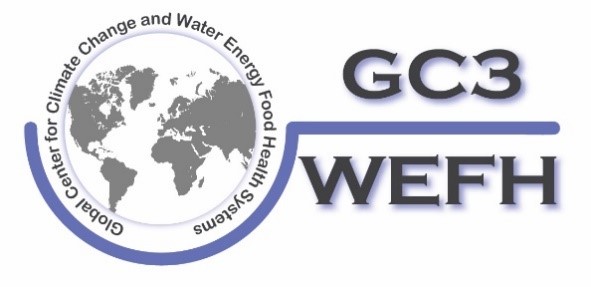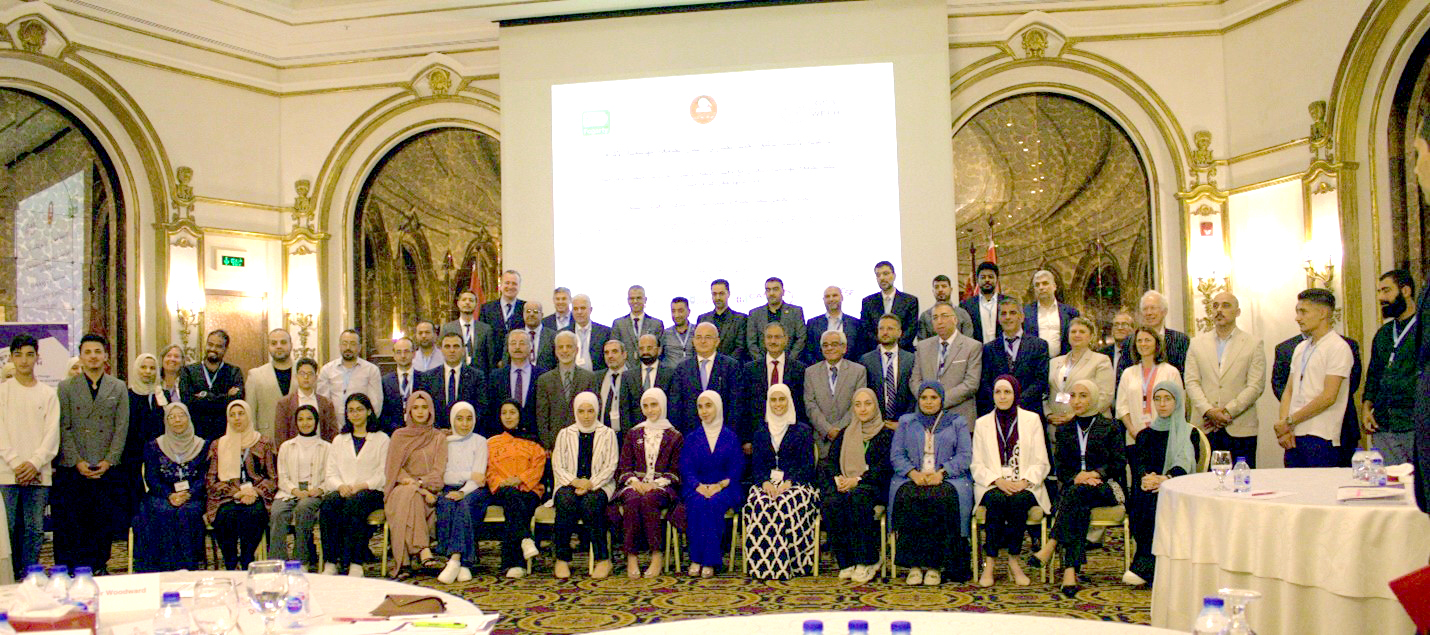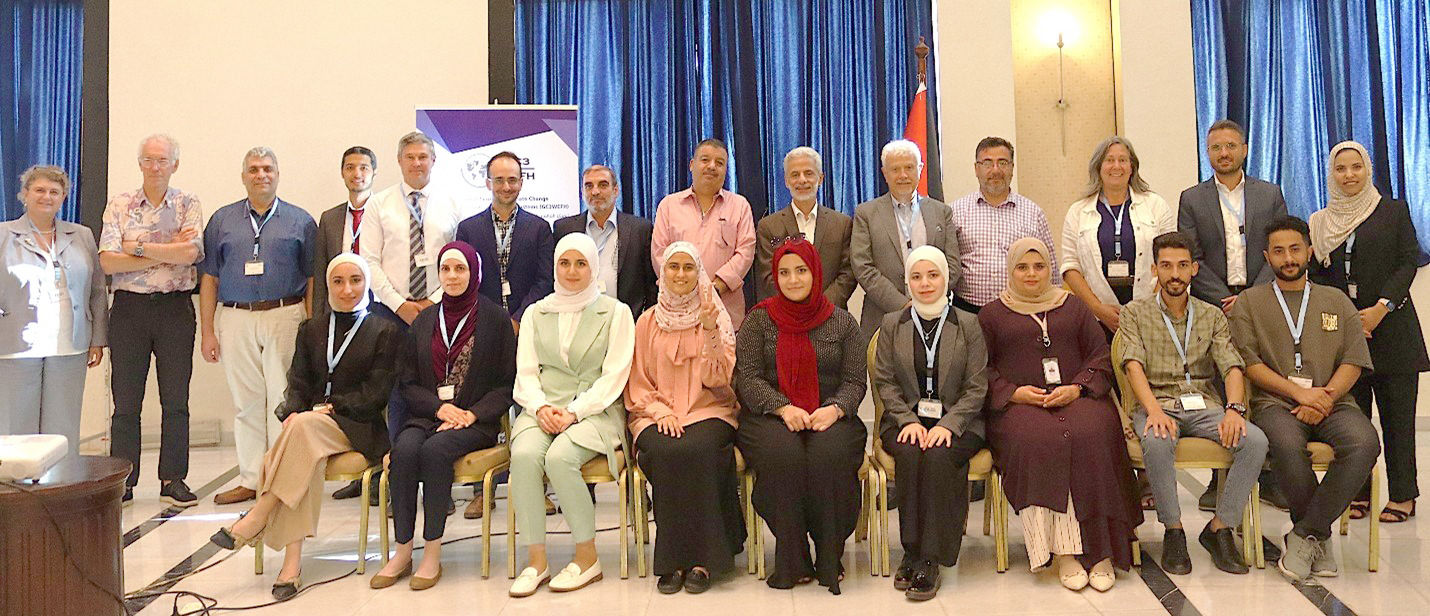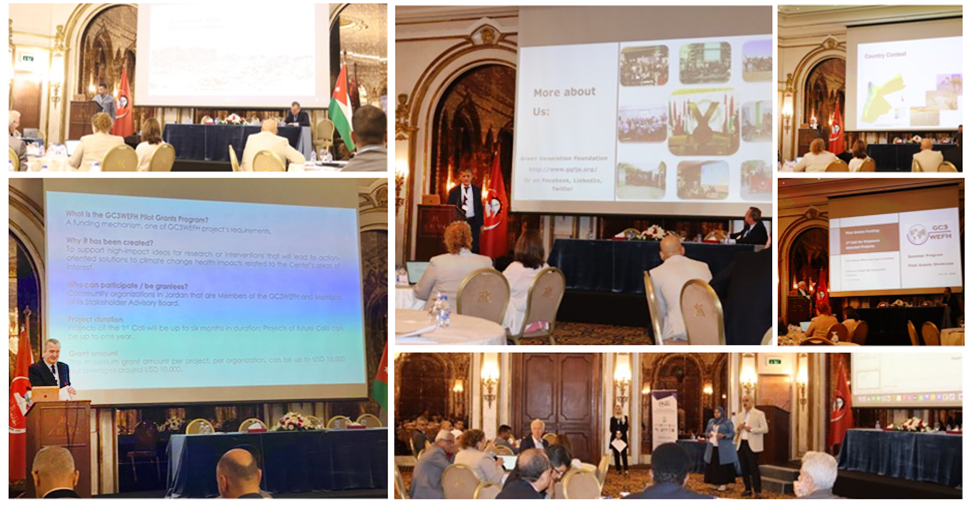Global Center on Climate Change and Water Energy Food Health Systems

As part of the Summer Program of the Global Center on Climate Change, Water, Energy, Food, and Health Systems that took place in Amman, Jordan from July 14 until July 16, 2024, the Texas A&M University team conducted an interactive training and engagement workshop on the Water-Energy-Food-Health Nexus and coordinated a session on the presentation of the Pilot Grants awarded during the 1st Cycle of the Program. Team members also visited the Zaatari refugee camp.


Interactive training and engagement workshop on the Water-Energy-Food-Health Nexus
As part of the Global Center on Climate Change and Water Energy Food Health Systems, funded by the National Institutes for Health, Dr. Rabi Mohtar, Professor in the Agriculture and Life Sciences Department of Biological and Agricultural Engineering and the Zachry Department of Civil and Environmental Engineering, as well as a Senior Advisor for Resource Nexus in the Texas A&M Energy Institute, Dr. Bassel Daher, Research Scientist at the Texas A&M Energy Institute, and PhD student Rashed Batayneh conducted an interactive training and engagement workshop on the Water-Energy-Food-Health (WEFH) Nexus in Amman, Jordan. The workshop was designed to provide participants with a comprehensive overview of the WEFH Nexus and its applications in resource management as well as to demonstrate the WEFH platform for quantifying access to adequate and safe water, energy, and food and its impact on health indicators. The event brought together multi-sectoral stakeholders and international organizations, fostering dialogue and collaboration on these critical issues.
Pilot Grants Showcase
On July 14, 2024, Dr. Konstantinos Pappas, Assistant Director of the Texas A&M Energy Institute, convened a session to highlight the GC3WEFH Pilot Grants Funding Program and showcase the achievements of its inaugural grantees. Five organizations presented their projects, each addressing critical challenges in Jordan:
- Sustainable Livelihoods: The General Union for Jordanian Farmers is enhancing community resilience through sustainable okra and quinoa cultivation in the Jordan Valley.
- Health and Climate Resilience: The Health Appeal Society is investigating the impact of climate change on non-communicable diseases while the Green Generation Foundation is building nursing capacity for climate adaptation.
- Water Security: Isnad International Center for Empowerment and Development is implementing water conservation strategies in Mafraq, and the Royal Scientific Society is piloting greywater systems to address climate security in the same region.

Following the presentations, a robust discussion explored strategies to amplify community engagement, strengthen the capacity of community organizations in grant development and management, and expand participation in future Pilot Grant cycles. These insights will inform the program’s ongoing evolution and its ability to deliver sustainable impact.
These pilot projects demonstrate the potential of community-led initiatives to address complex challenges related to climate change, food security, and public health. The GC3WEFH program is committed to supporting innovative solutions that improve the lives of vulnerable communities.
Visit to Zaatari Camp
The team’s visit to the Zaatari Camp offered a glimpse into the challenges faced by the camp’s residents. The visit included interactions with camp administrators and focus groups involving community representatives. Key issues highlighted include water shortages, inconsistent electricity supply, and inadequate food access. The focus group discussions revealed the adaptive strategies employed by residents, such as water conservation methods, the use of greywater, and the significant mental and physical health challenges stemming from these shortages. The notes also emphasize the need for enhanced training in water and energy management and the potential for agricultural initiatives to improve both food security and mental well-being in the camp.
The Global Center on Climate Change and Water Energy Food Health Systems – GC3WEFH
Climate change casts a long shadow over the 21st century, posing an existential threat to global health. Yet, the health implications of this crisis are often overlooked in regions most vulnerable to its impacts. The Middle East, a region grappling with water scarcity, extreme heat, and political instability, stands at the precipice of a humanitarian catastrophe. Jordan, a relatively stable oasis in a turbulent region, faces a daunting water crisis. The northeastern Azraq Basin, already a water-stressed area, has become a refuge for nearly 120,000 Syrian refugees, intensifying the competition for scarce resources.
The Global Center on Climate Change, Water, Energy, Food, and Health Systems draws on a transdisciplinary team to address multifaceted, evolving climate change through long-term capacity building. Focusing on water scarcity in vulnerable communities, the center seeks to address the interplay of the water-energy-food-health nexus. More than 30 scientists will support evidence-based approaches aimed at improving the health and wellbeing of residents within rural communities and refugee camps. The Center’s mission is to address climate change health impacts through new approaches and systems science with a diverse multidisciplinary team of scientists and offer scalable solutions for the most vulnerable global communities.
The Center’s work in Jordan will serve as a proof of concept for addressing climate-related health threats on a global scale. By establishing a collaborative platform in Jordan, we pioneer innovative solutions that address the interconnected issues of water, energy, food, and health. The Center’s focus on the Azraq Basin will enable its team to work closely with local communities, empowering them to build resilience and adapt to the changing climate. Through rigorous research, community engagement, and capacity building, interventions that improve health outcomes and enhance water security will be developed.
The GC3WEFH’s goal is to create a replicable model that can be scaled to other regions facing similar challenges. By demonstrating the power of interdisciplinary collaboration and community-centered approaches, the GC3WEFH will contribute to a healthier, more resilient future for all.
The role of Texas A&M in the GC3WEFH
The Global Center on Climate Change, Water, Energy, Food and Health Systems is led by the University of California San Diego Herbert Wertheim School of Public Health and Human Longevity Science and supported by an international consortium of universities and community organizations (i.e., Texas A&M University, University of Jordan, Hashemite University, Climate Action Network, Royal Scientific Society and University of California San Francisco). The effort is led by principal investigator, Wael Al-Delaimy, M.D., Ph.D., UC San Diego Herbert Wertheim School of Public Health.
Dr. Rabi Mohtar, Professor in the Texas A&M College of Agriculture and Life Sciences Department of Biological and Agricultural Engineering and the Zachry Department of Civil and Environmental Engineering, as well as a Senior Advisor for Resource Nexus in the Texas A&M Energy Institute, is serving as the Deputy-Director of the GC3WEFH center. Dr. Mohtar leads the Texas A&M efforts. He collaborates with Dr. Bassel Daher and Dr. Konstantinos Pappas, both in the Texas A&M Energy Institute, and supported by Rashed Batayneh, PhD student. Mohtar leads the Center’s Research Core, the main aim of which is to highlight the interconnectedness of water, energy, food and health (WEFH) sectors through the development of a dynamic decision support tool. The coordination of planning, financing, and governing these sectors in order to achieve sustainable development and promote the well-being of individuals and communities will be a primary focus. The WEFH tool will guide evidence-based actions to improve health resilience under growing climatic, demographic and geopolitical shocks that can be scaled-up regionally and globally. Moreover, the Texas A&M team participates actively in other Center’s activities. Dr. Pappas is leading the Center’s Pilot Grants Program, a funding mechanism created to support high-impact ideas for research or interventions from community organizations in Jordan that will lead to action-oriented solutions to climate change health impacts related to the Center’s areas of interest. Dr. Daher and Dr. Pappas monitor and participate on the activities of the Community Engagement Core, whereas the Research Core actively collaborates with the Center’s Data Core on aspects related to the interpretation and analysis of research data.
